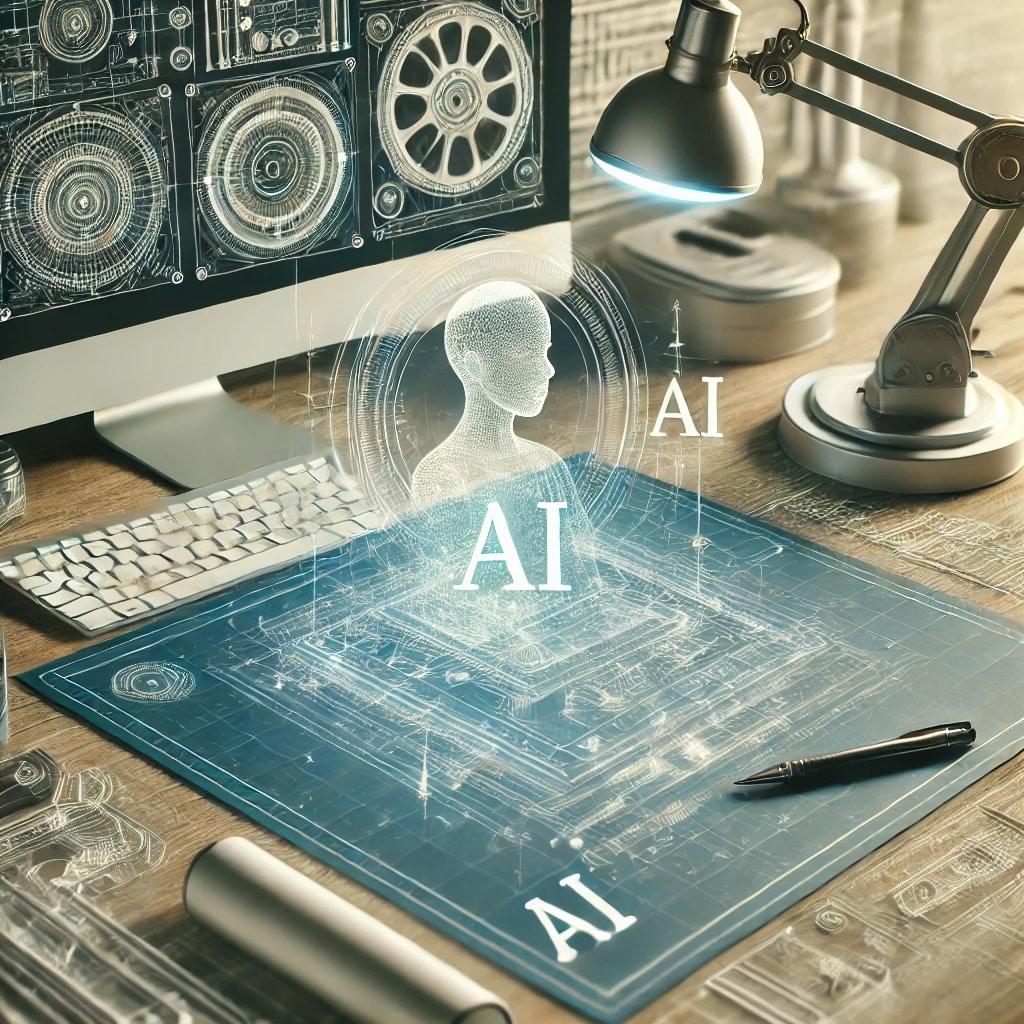
As the CEO of Alphabet Inc., Sundar Pichai, recently revealed, “More than a quarter of all new Google code is now generated by artificial intelligence, subsequently reviewed and approved by eight engineers.” This bold statement during Alphabet’s Q3 2024 earnings presentation showcases the scale and impact of generative AI within one of the world’s leading technology companies. Using AI in coding isn’t merely a convenience; it signals a transformative shift in how industries approach development, efficiency, and innovation. If AI can drastically enhance software development, what can it do for sectors like mechanical and industrial design? For companies that design and produce physical products, such as components, machinery, and industrial equipment, the potential for AI to streamline processes, improve design accuracy, and foster creativity is just as significant. Mechanical and industrial design companies are beginning to embrace AI-driven innovations to revolutionize their workflows, and Convergence Consulting is at the forefront, guiding clients through this new terrain.
1. From Software to Physical Design: The AI Leap
In coding, AI-driven tools help generate complex code more quickly, maintain consistent quality, and empower developers to focus on higher-level problem-solving. In mechanical and industrial design, AI has similar benefits but must grapple with unique challenges, such as the physical constraints of real-world products and manufacturing processes. Here’s how AI is reshaping this industry:
- Accelerating the Design Cycle: In traditional design, generating multiple prototypes is time-intensive and costly. AI-enabled design tools can process enormous data sets and propose optimal design solutions in seconds. For instance, generative AI software can rapidly suggest design iterations based on specific parameters, like strength, weight, and material cost, while taking manufacturing capabilities into account.
- AI’s role in reducing time to market is significant. Swift, iterative design adjustments minimize the time spent in early development stages, accelerating time to market—a crucial factor for companies in competitive markets. AI assists engineers in refining prototypes faster than ever, ensuring companies can meet and exceed client expectations for speed. This reassurance about the efficiency of AI in product development is invaluable.
2. Enhancing Product Innovation and Creativity
AI in design is not just about efficiency; it’s about unlocking new realms of creativity. Generative AI tools can craft intricate shapes and forms, offering solutions that push the boundaries of traditional design. These designs often mirror structures found in nature, opening up a new level of efficiency in terms of material usage and load distribution. This potential for creativity is truly inspiring for the future of mechanical and industrial design.
- Augmented Creativity: For designers, AI acts as a catalyst, generating unconventional design alternatives they might not have considered. It can suggest forms that are more aerodynamic or shapes that use less material without compromising strength. This augmented creativity means that even seasoned designers find AI a valuable partner in sparking new ideas and possibilities.
- Biomimicry and Optimization: AI models can mimic biological forms, an approach known as biomimicry, which can lead to highly optimized designs for structures, machinery, and components. These designs can save resources and increase efficiency, particularly valuable in fields like aerospace and automotive engineering, where weight reduction and strength are paramount.
3. Precision Engineering and Quality Control
Mechanical products must be not only functional but also reliable. AI’s role in predictive modeling is invaluable here, allowing designers to anticipate how a product will perform under specific conditions without having to create multiple physical prototypes.
- Enhanced Precision: Machine learning models can accurately predict performance based on design specifications. In the aerospace and automotive industries, engineers rely on AI to analyze stress points in designs to ensure that products meet durability and safety standards without excessive material use.
- Cost Reduction: By reducing the number of physical prototypes needed, companies can cut down on material costs and labor hours. AI can also analyze a design’s manufacturability early on, identifying potential issues before they reach production.
4. AI in Material and Manufacturing Optimization
AI also enables companies to refine how they select materials and plan manufacturing processes, helping to maximize both economic and environmental sustainability. By analyzing and learning from large datasets, AI can suggest the best materials for each component, reduce waste, and minimize the environmental footprint of a product.
- Material Selection and Sustainability: AI can assess the impact of different materials, recommending options that balance performance, cost, and sustainability. For companies committed to green manufacturing, this is a significant advantage, as they can produce high-quality products that meet rigorous environmental standards.
- Manufacturing Process Optimization: AI can provide insights into optimal production techniques, such as additive manufacturing or CNC machining, and suggest design tweaks to reduce machining time or material waste. This results in cost-effective production processes, which is particularly valuable in large-scale manufacturing.
Challenges of Integrating AI in Mechanical and Industrial Design
While AI holds immense promise, integrating it into product development isn’t without challenges. There are potential risks, such as over-reliance on AI predictions, which could lead to design stagnation or lack of creativity. It’s important to balance AI’s capabilities with human ingenuity to ensure the best outcomes.
- Data quality is the backbone of AI systems. In design, where every product may have unique requirements, it can be challenging to amass data that accurately reflects all use cases. However, ensuring data quality is essential to maintain reliability and accuracy in AI predictions. This emphasis on data quality will make the audience feel the necessity of investing in data management for successful AI integration.
- Adapting Legacy Systems: Many companies rely on legacy design tools and processes. Transitioning to AI-driven systems requires careful integration without disrupting ongoing workflows. It often involves a learning curve and demands new skills, particularly in data analysis and machine learning, among design teams.
- Evolving Skill Requirements: While AI can automate repetitive tasks, skilled professionals are needed to oversee these systems and interpret results. The industry faces a growing need for professionals who bridge traditional design knowledge with AI expertise, a unique blend of skills that can be challenging to develop quickly. It’s crucial to maintain a balance between AI and human expertise in the design process.
Convergence Consulting: Pioneering AI Integration in Product Development
At Convergence Consulting, we specialize in helping mechanical and industrial design companies leverage AI effectively within their product development processes. We are committed to guiding clients in developing tailored AI solutions, enhancing operational efficiency, and driving innovation through AI-based tools. Our role is to provide strategic guidance and practical support throughout the AI integration process.
- Custom AI Solutions for Your Needs: We provide consulting services to help companies define clear AI strategies that align with their specific design and manufacturing goals. By understanding your unique challenges, we create AI solutions that integrate seamlessly with your existing systems.
- Support for Skill Development: Recognizing the new skills required, Convergence Consulting offers comprehensive training for design teams. Our goal is to empower professionals to use AI effectively, fostering confidence in AI-driven tools.
- Ongoing Collaboration: We provide continuous support to our clients, ensuring that AI tools remain effective and up-to-date with industry advancements. As your business evolves, so too does our commitment to helping you maximize your AI investments.
Embrace the Future of Product Design with Convergence Consulting
The impact of AI in design is poised to redefine industry standards, bringing unprecedented speed, efficiency, and creativity to product development. Companies that harness AI to streamline their processes, reduce costs, and generate innovative solutions are setting themselves up to lead in tomorrow’s market.
Discover how Convergence Consulting can transform your product development process. Reach out today to explore a new era of AI-driven design and manufacturing excellence.

Leave a Reply